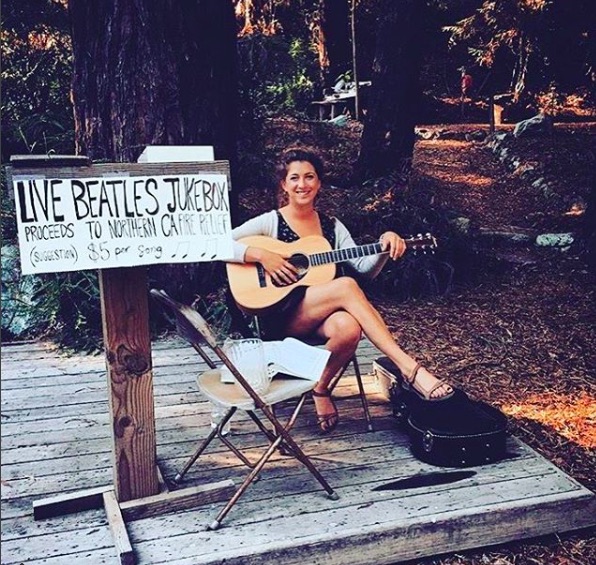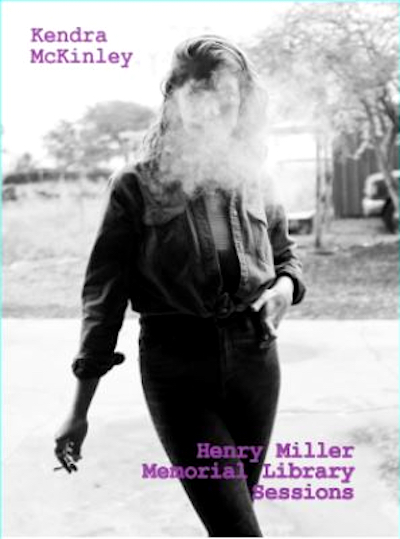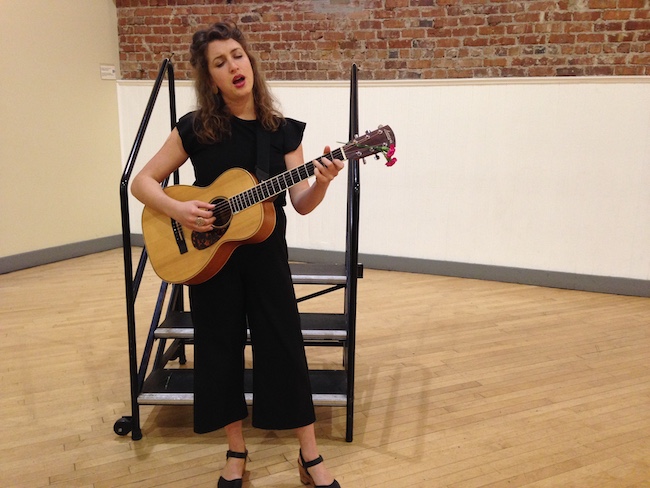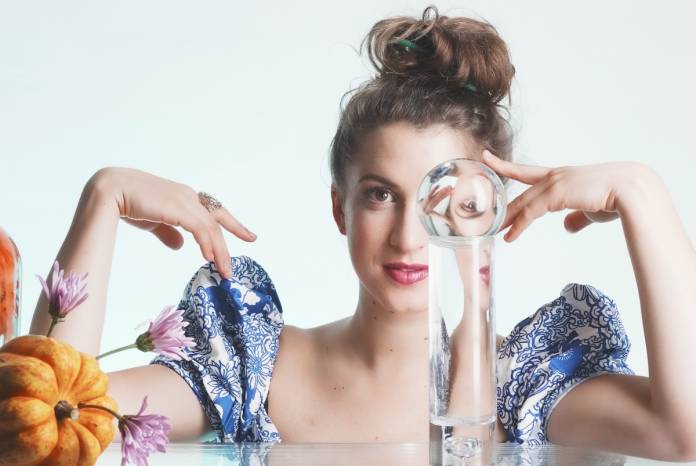ALL EARS In the high season of May to October 2017, Big Sur was ghost town. The Pfeiffer Canyon Bridge was under construction in the north when mudslides wiped out Highway 1 in the south, leaving 35 miles of majestic coastline accessible only by a winding, three-hour detour through the Santa Lucia mountains.
Big Sur Island—as the locals called it—disappeared with the reopening of the bridge, but you can hear its echo in Henry Miller Memorial Library Sessions, the new EP from Bay Area singer-songwriter Kendra McKinley. For five weeks starting that September, McKinley was the artist-in-residence at the Henry Miller Library—though “residence” perhaps oversells the living conditions, which involved tent camping and boiling her own shower water. McKinley returns to the Henry Miller Library on December 7 for an EP release concert that will weave together the songs she wrote and recorded there with tales of her adventures and the characters she met along the way. Diana Gameros will open the show with songs from her own recent album, Arrullo.
McKinley offered a deep dive into the transformative power of an experience as rare as a trip to Big Sur Island: the chance for a Bay Area artist to step out of the hustle and just create art. It took battling rodents, and facing down her own demons, for the chanteuse to finally “peel back the bullshit” and delight in her own first takes.

48 HILLS How did you come to do a residency at the library in the first place?
MCKINLEY I played at Henry Miller Library twice before, so I had a relationship to the place. Every single time I go to Big Sur, I just always felt like the fullest version of myself. Everything makes sense. Mental knots untie. And that was very attractive for someone who’s a songwriter to imagine what it would be like to go there and be creative. And my friend Sarah Shashaani who works there, told me that, because it was basically a ghost town, that it would be a great time to do a residency.
48 HILLS Did you live on-site? What was the setup?
MCKINLEY I lived in a tent, for five weeks, on-site. I would work in the bookstore three days a week. I performed free concerts there every Saturday, for whichever guests managed to take the brave trek. I would just have the door wide open, and I would be playing piano, and then a cyclist would come in, and they’d be enchanted by this weird place, and they would sit down and forget what time it was. That was the default setting.
And other than that, I just got to make music there. And I could not be peeled away from my instruments. It was the first time in my life that I actually got to approach songwriting like a full-time job. Having that freedom was fabulous because that’s what I would love to be focusing on at all times, but the realities of being a musician means that you have to hustle and have a lot of jobs. On a creative level, it just was so nourishing.
It’s also really intense because there’s no internet, there’s barely any people, and you’re just kind of there with yourself. That degree of introspection can be extremely uncomfortable because you have to accept these things about you that you don’t want to accept. And one of those things about me was that I am an absolute perfectionist when I make things. And when you let that perfectionism win, you don’t get to enjoy the process.
48 HILLS What were your goals going into the experience?
MCKINLEY I had a goal to make an EP. But I also deliberately challenged myself to abandon a sense of preciousness about the creative process. I have a lot of voice memos, one of which is: I was working on a song on the piano, and a person comes in, and I start to have a conversation with them, and now I’m writing songs with other people in the room!
One of the songs on the EP was actually the second song I’d ever written as a high school student. I wanted to revisit that to embrace this whole notion of accepting the first take in the recording process, thinking about a recording experience as capturing a moment, instead of obsessing over perfection.
48 HILLS It’s so interesting to hear you say that because I remember reading a Bay Bridged piece that was written while you were recording your first album, Treat. The writer is worrying that the song “Telling Truths” won’t even make it on the album because you didn’t like your vocal take.
MCKINLEY Precisely. I just think that we get in our own way, in so many different areas of life. With Treat, I also was in the studio for the first time and was trying to make a definitive statement about the artist that I was, without actually knowing what that meant. I wasn’t able to direct the project or distill it into a statement because I was also just completely enchanted by the fact that I was in a studio. Each song is like a musical buffet, and I’m trying to figure out: what meal of the day are we eating? I like all these different ingredients, but how do I make a meal that I can serve?
48 HILLS Did your songwriting change as you let go of your pursuit of perfection?
MCKINLEY I think of that songwriting chapter as a palate cleanser. Treat was a very theatrical, extroverted work, and I just felt so tired from pretending that I was still that same person that made it. I needed to introspect. And that’s why, even though I brought my laptop, I just wanted to play the funky piano that was filled with excrement because it was in the woods. That’s a whole other challenge of recording there: dealing with Rodentia.

48 HILLS I was going to ask how you were able to record there! Were you dealing with rodents in more ways than just the piano?
MCKINLEY My friend Scott McDowell, who’s an engineer at Hyde Street Studios, drove down, and we just recorded when the library was closed, over the course of two and a half days.
And we’d be tracking, and then we’d hear this knocking noise and be like, “Okay, we have to figure out what it is because we can’t record if there’s intermittent knocking.” So we would investigate: “Oh, oh, it’s in this cupboard!” Pull out miscellaneous nails and books, and just vacuum it out, and clog up the hole that was created by mice—and that would take an hour. And then go back and be like, “Okay, now I’m going to track some bass.”
48 HILLS Can you describe one of the songs that you wrote and recorded while you were there?
MCKINLEY To me, “Face to Face” is the thesis statement of the whole thing. That was the beginning of week three of being there, when the initial dazzle and enchantment started to wear off and the uncomfortability of being with yourself started to kick in. And I was experiencing some definite roadblocks with songwriting where I was catching myself thinking too much about what I wanted it to become, instead of just writing something from an honest place.
I called my friend Sarah, and I told her about my predicament, and she was like, “You should read this article about Joni Mitchell writing Blue that just came out in The New Yorker today because she talks about a lot of those same things.” And so I read the article. It struck many chords. And I sat down, and I thought, “Okay, I’m going to let Joni be the muse, and I’m just going to write about what this actually feels like.” And the song just fell out, essentially as a finished thing. It really felt like the thing that I wanted to touch while I was there: the fusion of feeling uncomfortable, feeling stoked, feeling happy, feeling sad, feeling electric, feeling acoustic, just all of the oppositions.

48 HILLS You have a very arresting stage presence, so I also wanted to ask about how you’ve developed that. In particular, I think you’ve found a way of representing female sexuality onstage in a way that feels so healthy. Is that something you think about?
MCKINLEY Sexuality has always been interesting to me. And it’s such a difficult thing to embrace because the line between being objectified and being seen as empowered is relative to the person viewing it. But for me, being on a stage and playing amplified music, getting to dance about it, having this opportunity to tell as honestly as I want what I’m actually thinking and feeling—it feels like it! In the sense that your entire sense of self is activated. I feel like one of the defining characteristics of the music I’m making now and my stage show is that it is sensual, in a way that feels so feminine.
48 HILLS You’ve said that your work at the Henry Miller Library would be the basis for future albums. What’s next on the horizon?
MCKINLEY My brother [AJ McKinley]—who is my bandmate, producer, best friend—he and I started a few months ago making demos for this new album cycle, embracing a lot of these themes. I want it to be a cross between Joni Mitchell’s Court & Spark—so like very jazzy, narrative, cinematic, sensual storytelling—but with Funkadelic as the backing band. It is physical, it is rhythmic, it is funky. So we are making plans to record. Just taking what I learned from the Treat cycle and then getting the pieces in place to make a statement.
48 HILLS I’m going to pivot to another recent project: you were part of a performance art piece by Ragnar Kjartansson called Romantic Songs of the Patriarchy, where 30 female musicians staged a marathon performance of famous pop songs that have misogynistic lyrics. How did you become involved with that project?
MCKINLEY I met Ragnar because I attended his trial session in March, where they had an open call for musicians to come to the Women’s Building, and he could just try different things. I was the only woman there. He said that, when they saw me play, it became clear that the piece would be more effective when women sang it, and then he asked me to be the bandleader from there.
48 HILLS What did it feel like to play one deeply offensive song over and over for hours on end?
MCKINLEY Would you believe me if I said I felt everything? Beyond the inherent physical taxation of repeated motion, it was surprisingly energizing. That said, after a certain number of repetitions, I felt my sense of self sort of dissolve and be replaced by an acute sensitivity to the emotional states of the audience present. People would enter, weeping or visibly numb, and the intensity of their emotional state would influence how I played. Beyond that, there was a profound feeling of camaraderie and respect amongst the performers, which contributed to the feeling of women empowerment and devastation of what we have to endure as women. It was empowering to be a messenger using music to communicate such an urgent, relevant subject.
KENDRA MCKINLEY
Featuring Diana Gameros
December 7, 7pm, $10-20 sliding scale
Henry Miller Memorial Library, Big Sur
Tickets and more info here.




